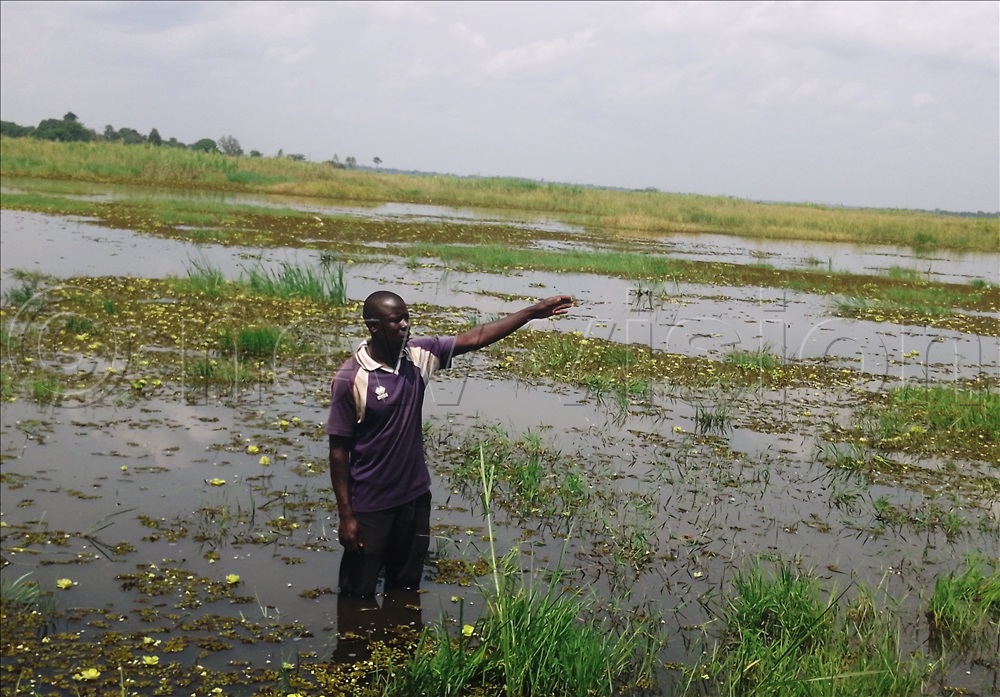By Tom Gwebayanga
Sugarcane farmers in Kamuli and Buyende districts who invested in the enterprise by hiring wetlands and swampy areas to grow the then lucrative fortune are losing cash worth billions.
In a space of four months, the farmers whose shambas are located in Nabigaaga, Wakukuuta and Namulanda wetlands that feed the River Nile and Lake Kyoga, are counting losses.
The floods have overwhelmed 90 percent of the fields, featuring depths ranging between 4-6 feet.
The floods have overwhelmed the vast fields, featuring mature withered, rotting cane swallowed by the risen waters and denying access to harvesters and cargo trucks.
Besides, the floods have also displaced 350 homesteads, whose occupants have been forced to relocate to rentals in nearby trading centres and close relatives’ homes.
The worst hit fields, according to Godfrey Biriwali, the Chairman of Greater Busoga Sugarcane Growers’ Union (GBSGU), are those located along Nabigaaga wetland bordering Kamuli and Buyende districts.

The worst hit farmers who have lost hundreds of acres are those who hired Nabigaaga wetland which pours into the River Nile through Kagumba and Ndolwa parishes in Kamuli and Buyende districts, respectively.
Other flooded fields are located along Wakukuuta wetland, which pours into Lake Kyoga through Namulikya, Igoola, Itanhinhi and Ngole villages in Bugaya and Kagulu Sub Counties, respectively.
In Namalanda wetland, Nkondo sub-county, cane sambas have been ravaged and farmers are also counting loses, according to Buyende LC5 Chairman, Michael Kanaku.
The floods that erupted due to water backlash from the water bodies, have become nightmarish, having destroyed over 2,500 acres of cane and food crops.
The community wonders why the floods keep extending week after week yet the rains reduced for close to two months now.
Both subsistence and commercial farmers have encroached wetlands to grow sugarcane and food crops, however; nature has since April reclaimed its former territories.
Sugarcane growing in wetlands stormed Buyende district in 2021 before local investors rushed to hire land in the wetlands of Nabigaaga, Wakukuuta and Naamulanda to grow the crop.
The target of investing in sugarcane was to grab the then-lucrative venture, featuring the then-high rates per ton at sh220,000 in 2023.
The farmers also targeted to provide sufficient cane to the seven sugar millers, especially Kidera Sugar factory under construction in Iringa town, Nkondo sub-county, Buyende district.
The mill is assumed to crush 1,000-1,200 tons per day.
The investors had projections of producing cane and bagging billions, the high anticipations that have hit a deadlock.
Farmers speak out
Recently, New Vision visited some of the affected areas where farmers are grappling with climate change, lamenting that the floods had swept away their billions.
Paul Nnaku Musana, 49, who owns 285 acres in Ndolwa–Opio, Iganga-Bunamanda and Ndolwa-Kalogoyi along Nabigaaga swamp, is one of the victims counting big losses.
“I invested in hiring the land, land preparations, seeds and drainage channels,” Musana said, adding that other expenses included manual labour and herbicides.
His projection was sh2.5b, which the floods have swept away!
“Ninety percent of the resources I used were loaned from the bank and Kaliro Sugar Works and per now, they’re running after me,” Musana said, adding that the institutions borrowed him sh150m and sh120m respectively.
Musana explained that the seeds were also ferried from distant mother shambas, in addition to catering for the welfare of manual labour, security and miscellaneous expenses.
Musana wondered where the floods came from because the wetland had been dry through the years, even at the time he initiated investing in the expensive venture.
He blamed the floods on the engineers constructing the Bukungu -Kagwara- Kaberamaido (BKK) Ferries, who allegedly reduced water flow from the River Nile to Lake Kyoga, to undertake technical advancements, causing the backlash.
He added,” We have learnt that the water flow was reduced to fix some engineering glitches in the process of building ferries.”
He appealed to the financial institutions to extend the grace period, otherwise, he’s destined to doom and eventually fall out of business, wondering when the floods will reduce.
Musana said that in 2022 before the investment kicked off, the land was dry, tillable with homesteads and gardens, which have all been submerged and abandoned.
“The floods chased the landlords whose land I hired. The floods restricted harvesting,” Musana said, adding that hiring labour to collect cane to the waiting truck, about three kilometres away, is quite cumbersome.
Musana added that when the workers brave the waters to harvest, labour costs to carry cane through the deep waters pose life risks of being bitten by serpents and crocodiles.
Moses Balikoowa, an investor who rented 90 acres in Nabirumba, Nabwigulu sub-county in Kamuli district, is another victim.
“Eighty percent of the shambas are submerged. The cane is simply rotting away,” Balikoowa said, adding that he invested close to sh100m in 2022, hoping to bag sh680m- sh720m by December 2025.
Similar scenarios feature in Buyende district where the above-waist-risen waters have denied access to harvesters and trucks.
Other affected shambas in Buyende district are located along the villages of Ndolwa –Kalogoyi, Kiige-Bugaga, Kiige-Bugobi , Iganga- Bunamanda and Iringa- Maani.
Rebecca Namuddu, the Buyende District Environment Officer, said that the floods not only extend after it has rained but voluntarily pour into the wetlands daily causing floods in the process.
With the July – September rains, Namuddu said, the floods are poised to cause more havoc, not only to the sugarcane industry but also to other crop enterprises.





